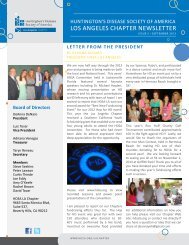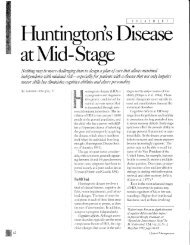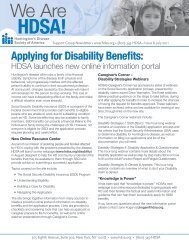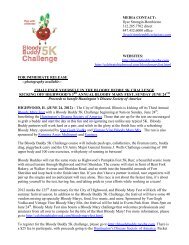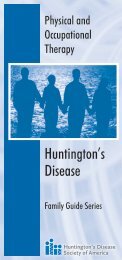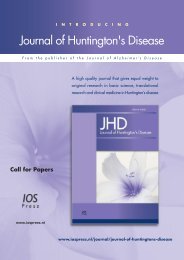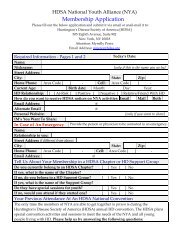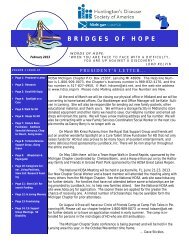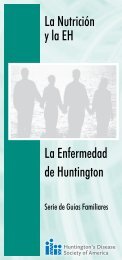The Marker - 2004 - Huntington's Disease Society of America
The Marker - 2004 - Huntington's Disease Society of America
The Marker - 2004 - Huntington's Disease Society of America
Create successful ePaper yourself
Turn your PDF publications into a flip-book with our unique Google optimized e-Paper software.
WHAT DO EACH OF THESE HD PROJECTS STUDY?<br />
Brain Bank: <strong>The</strong> purpose is to obtain brain<br />
tissue from individuals with HD and related<br />
disorders in order to better understand the<br />
pathological changes that occur in the<br />
brain (See Fulfilling the Promise issue <strong>of</strong><br />
<strong>The</strong> <strong>Marker</strong> for complete list <strong>of</strong> brain banks<br />
for HD).<br />
Changes in Walking Patterns: A pilot<br />
study that defines problems and develops<br />
strategies for improving gait in early HD.<br />
CREST: Creatine Safety and Tolerability in<br />
HD determines the safety and tolerability <strong>of</strong><br />
Creatine in patients with HD as well as<br />
whether Creatine is beneficial in treating<br />
the symptoms <strong>of</strong> the disease.<br />
fMRI: Functional Magnetic Resonance<br />
Imaging is used to produce pictures <strong>of</strong> the<br />
brain. Gene positive, pre-symptomatic<br />
adults (18 years and older) are being<br />
recruited for this four-hour project that<br />
takes place in Milwaukee, WI.<br />
Genetic Discrimination Study asks those<br />
who have been genetically tested to<br />
participate in a one-time telephone<br />
interview to gather information about<br />
experiences and perceptions regarding<br />
discrimination in order to identify topics <strong>of</strong><br />
concern to those at risk for HD.<br />
Genetic Factors that Influence HD: <strong>The</strong><br />
purpose is to find genes that modify age <strong>of</strong><br />
onset or other features <strong>of</strong> HD. Finding these<br />
genes may provide clues for therapeutic<br />
approaches. HD MAPS is a larger study <strong>of</strong><br />
this premise.<br />
General HD Battery asks individuals at<br />
risk or diagnosed with HD to participate in<br />
this yearly two hour study which assesses<br />
motor, psychiatric, cognitive and behavioral<br />
changes.<br />
HD and Long Term Care: This study<br />
looked at the characteristics that predicted<br />
nursing home placement for people with<br />
HD. This study has been completed but a<br />
modified study is being considered.<br />
HD MAPS: HD Modifiers in Age at<br />
onset in Pairs <strong>of</strong> Siblings uses siblings to<br />
investigate the genetic factors that<br />
influence the age at which HD onset occurs<br />
and its severity. <strong>The</strong> study requires a blood<br />
sample from affected brothers and sisters<br />
and information about age <strong>of</strong> onset.<br />
Identification <strong>of</strong> Neurological and<br />
Psychiatric Disorders: This study identifies<br />
and characterizes the genetic causes <strong>of</strong><br />
inherited neurological and psychiatric<br />
disorders. Participants must be affected with<br />
symptoms similar to HD.<br />
Immune-HD studies the alterations in<br />
systemic immune functions in HD.<br />
Interviews on Living with HD: Interviews<br />
are conducted with individuals who have or<br />
are at risk for genetically related disorders,<br />
including HD, concerning their views on<br />
genetic privacy and their experiences.<br />
Longitudinal UHDRS database is a multiyear<br />
project to develop a database <strong>of</strong><br />
individuals that are at risk or have HD.<br />
This information will ultimately be used to<br />
plan for future research studies.<br />
Memantine for HD: Study sponsored by<br />
Forest Pharmaceuticals <strong>of</strong> the effects <strong>of</strong><br />
memantine on cognition, behavior and<br />
functioning in HD.<br />
MRI: Gene positive individuals may<br />
participate in this project that uses<br />
magnetic resonance imaging (MRI) scans<br />
to measure the volume <strong>of</strong> different regions<br />
<strong>of</strong> the brain in order to gain information<br />
about the disease process for HD.<br />
Neuropsychiatry Inventory in HD is a<br />
unified effort by various HSG sites to<br />
gather standardized information concerning<br />
behavioral problems in individuals with HD<br />
as perceived by their primary caregiver in<br />
order to establish baseline clinical<br />
information that might lead to future<br />
studies/research.<br />
Optimism: This project studies optimism,<br />
coping styles and distress. Information<br />
gathered will help researchers understand<br />
how certain beliefs influence mental health<br />
and ways that people with HD deal with<br />
situations.<br />
Outreach Study: This study observes<br />
the development <strong>of</strong> symptoms <strong>of</strong> those<br />
diagnosed with HD over a lifetime. Patients<br />
are followed on an annual or bi-annual<br />
basis when no longer able to travel to clinic<br />
to monitor changes in the condition <strong>of</strong><br />
each patient. This is an extension <strong>of</strong> the<br />
Longitudinal UHDRS database and allows<br />
those who can no longer attend clinic to<br />
contribute to research.<br />
OxPhos: This study looks at how people<br />
with HD use sugar and oxygen in the brain.<br />
PET Imaging: Positron Emission<br />
Topography (PET) is used to examine brain<br />
function in both HD patients and persons<br />
at risk for HD. <strong>The</strong> goals <strong>of</strong> the project are<br />
to explain the mechanisms underlying the<br />
different symptoms <strong>of</strong> HD and to find<br />
better ways to measure progression in HD.<br />
PHAIMOS: Prospective HD Assessment<br />
using Indices for Motor Skill is an HDSA<br />
funded study that looks at motor control in<br />
people who are gene positive for HD or<br />
have been recently diagnosed through one<br />
or more sessions lasting up to two hours.<br />
PHAROS: Prospective Huntington At<br />
Risk Observational Study looks at people<br />
who are at risk for HD to determine the<br />
earliest signs <strong>of</strong> the disease using interviews,<br />
surveys and examinations every 9 months<br />
for up to 10 visits.<br />
PHEND-HD: Phenylbutyrate<br />
Development for HD will evaluate the<br />
safety, tolerability and clinical impact<br />
<strong>of</strong> the drug phenylbutyrate and will begin<br />
in Spring <strong>2004</strong>. <strong>The</strong> study will last 20<br />
weeks with a visit or telephone contact<br />
every four weeks.<br />
18



